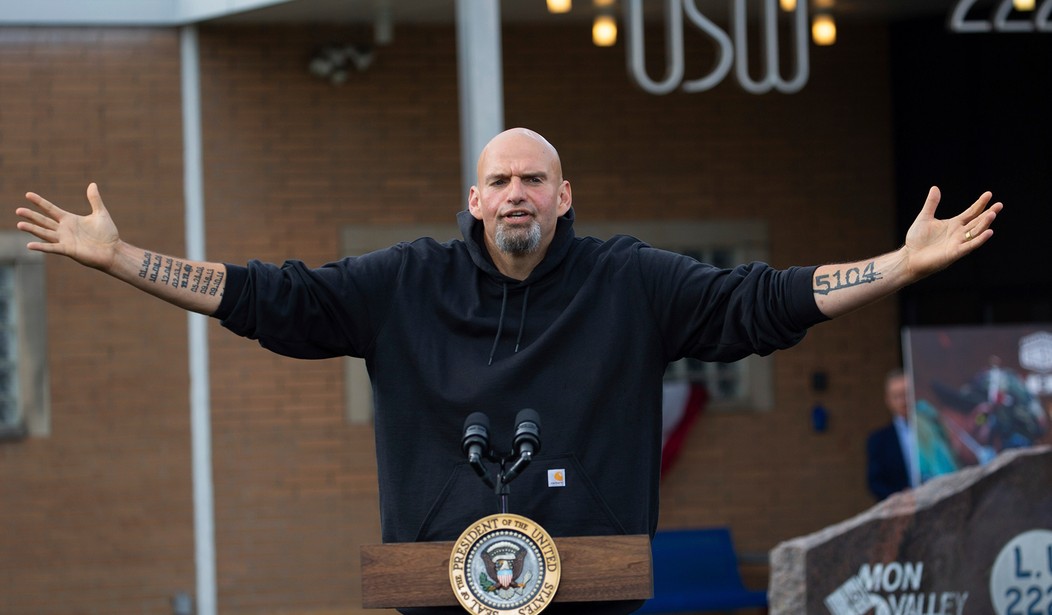Terrible advice in terms of good governance. In terms of political strategy, however, Senate Democrats’ reaction to criticisms of John Fetterman may strike a balance between wisdom and necessity. Politico reports this morning that Fetterman’s allies are defending the Senate hopeful’s low-engagement strategy, essentially endorsing a candidate not engaging on the campaign trail to own the cons:
As the hotly contested race enters the critical two-month general election stretch, Democrats are advising Fetterman to hold to his strategy as GOP nominee Mehmet Oz and other Republicans allege that Fetterman may not be physically able to serve as a U.S. senator. That means not rushing into an early debate with Oz and remaining selective about public appearances.
“Listen, Fetterman doesn’t need to debate him right now,” said Sen. Jeanne Shaheen (D-N.H.). “Because he’s ahead. It’s still early. I think, ultimately, he will [debate]. And why should he help Oz’s campaign? Why does he need to do it now?”
Er … what? Fetterman needs to do it now because the election is eight weeks away. Labor Day has passed, and with it the last of the electoral-campaign doldrums. Thanks to early voting, the decision point for some Pennsylvania voters is a lot closer than that — perhaps as soon as a couple of weeks from now.
Fetterman did concede late yesterday under pressure, offering Oz one debate, but not until early voting was already well under way:
On Wednesday, Fetterman agreed to a debate with Oz later in October, a move that comes after a fusillade of GOP attacks on his reluctance to commit to going toe-to-toe with Oz. The burly lieutenant governor of Pennsylvania suffered a stroke in May, an episode that has complicated multiple facets of his campaign, including traditional events, interviews and opportunities to verbally spar with his Republican opponent. …
Democrats warn that Oz is trying to trap Fetterman in a frantic attempt to regain momentum after trailing in every public poll this summer.
Certainly that’s part of it. Oz fell behind early and stumbled, but he’s also been on the road making voter contacts and building up his campaign in a traditional manner. Fetterman clearly has not, but the media has largely given him a pass on that — understandably so at first, given the stroke and an early potential that it might not be serious. That became less understandable in the summer, when it became clear that the Fetterman campaign and Democratic Party were being much less than honest about Fetterman’s recovery from the stroke.
That brings us to the good-governance issue. Put the party considerations and polling aside and ask this: what do senators do? They debate, discuss, negotiate, and make decisions on important public policy. If a candidate is incapacitated in a manner that makes such tasks difficult or impossible, shouldn’t voters know that?
And how do they make those assessments? They watch the candidates debate, discuss, and to some extent negotiate those issues with voters and each other during the campaign. If a candidate is incapable of accomplishing those tasks in a campaign, then voters can rightly conclude that they’re not up for the office they seek, either. This advice is almost an admission of that status with Fetterman … and an admission that Democrats just don’t care, either.
Democrats might find themselves using the wisdom of necessity by encouraging Fetterman to stay off the campaign trail. Instead, they should have taken the wise choice in June of replacing a clearly incapacitated Fetterman with a candidate who is up to the tasks of campaigning and serving in office. That would not just have put them in a better position ethically, it probably would have removed any electoral risk as well. It certainly would have left them looking less desperate than Democrats look now in telling Fetterman to remain in hiding lest he give voters reasons to vote for Oz … which is the clear message from Fetterman’s allies.







Join the conversation as a VIP Member